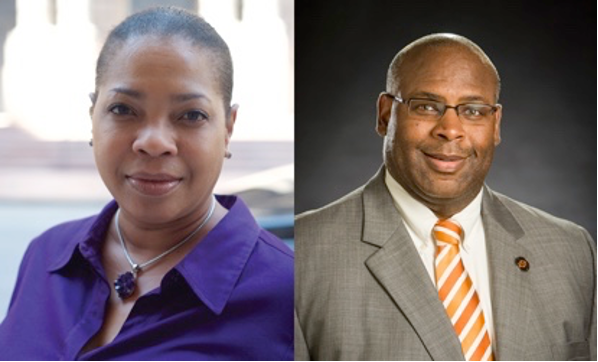ATSU hosts fifth Cultural Proficiency Speaker Series event
Posted: November 17, 2020
The fifth installment of A.T. Still University’s (ATSU) President’s Cultural Proficiency Speaker Series Open Forums served as another opportunity for ATSU’s community to have open and honest discussions on race, class, culture, and equity. Featured guests for this discussion included Felicia Pulliam, JD, chief executive officer, Create Community, LLC, and Jason F. Kirksey, PhD, MA, vice president for institutional diversity and chief diversity officer at Oklahoma State University (OSU). The topics of conversation included cultural proficiency, cultural humility, cultural responsiveness, compassionate competency, and small acts of exclusion as mitigating tools of microaggressions.
“Leaders of all levels must examine how our words, our actions, and our inaction can create consequences that are not intended,” Dr. Pulliam said. “Most importantly, leaders must work to mitigate those damages in a highly charged environment while infusing diversity, equity, and inclusion at the center.”
When there is a table full of individuals with the same experiences and same perspectives, Dr. Pulliam said there can often be someone with a different experiences or perspectives who is overlooked and might bring a valuable idea or solution to a problem.
“It’s important that we broaden the table and make sure that we have people with different perspectives, ideas, and experiences there to help us understand what is happening in our communities and how we can come up with the best solution,” Dr. Pulliam said.
As a University, there is an importance to be inclusive and diverse within the local community. Even when an institution is in the middle of an underrepresented, underserved, and marginalized community, many members of the community do not always see themselves as part of the institution. So, it is essential to be a good community neighbor and work to build trust.
“Build the trust, get others to believe in us and be a part of us,” Dr. Kirksey said. “Certainly, when we talk about underrepresented, underserved, and marginalized communities and how we can better serve them, we first have to create a semblance of trust between and amongst ourselves.”
Dr. Kirksey also mentioned a common achievement between OSU and ATSU, both being consecutive recipients of the Higher Education Excellence in Diversity (HEED) award. While OSU has been honored with nine consecutive years of awards, ATSU has received the award the last four consecutive years.
“ATSU has been a multiple-year HEED award recipient, which is certainly something that all of you should be proud of,” Dr. Kirksey said. “People often think the awards mean the institution is perfect or has achieved something. They just mean that in comparison to our peers, we’re doing some things dramatically different that help us move forward and advance a culture of inclusion to a greater degree than other institutions.”
Individuals can contribute to the collective diversity and inclusion work of the University by taking time to examine their own biases. Dr. Pulliam says while we all have biases, it is not uncommon for people to not know where their biases are.
“We have to be able to identify them, to know what they are so that we recognize whether or not we’re making a decision, comment, or doing something based on our biases,” Dr. Pulliam said. “When you examine them, then you develop that skill and the opportunities to think, ‘That’s the bias, let me put that to the side and not let it influence my decision making, not let that influence my perception of this situation.’”
The path to a fully inclusive, equitable, and diverse population is not one that is going to improve overnight. It requires different choices, different decisions, and different actions. It also requires new knowledge, new relationships, and new habits. Dr. Pulliam says it is a process and a journey and requires conversations be handled with courage and kindness.
“One of the things I think is very important for us to understand is that we’ve got to accept that this is a process. It’s a journey. It’s not something that we are ever going to just get to. We are going to be working on this consistently over the course of our lifetimes in our personal and professional lives, and that is how we remain proficient,” Dr. Pulliam said. “Whenever I’m training, I let people know we are all going to make mistakes, but we are going to enter into this learning, into this conversation with courage and kindness.
ATSU faculty, staff, and students can access series recordings by visiting the Portal and choosing the “Cultural Proficiency Climate Study” link. A link to the series can then be found on that page’s top navigation.
Learn more about diversity at ATSU by visiting atsu.edu/diversity.